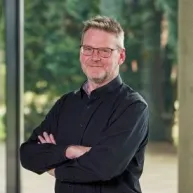Molecular Plant Microbiology
Plants, plant products, or photosynthetic processes dominate our nutrition, most of our health, and a significant part of our biosphere in one or the other way. The tiniest lifeforms, microbes, are not only ubiquitously distributed on Earth but they also frequently interact with plants or algae, influencing their repertoire of primary and secondary metabolites. We focus on four major research goals:
- Cocoa: In cooperation with a big industrial cocoa producer, analytical chemists, and systems biologists, we analyzed microbe-induced metabolic changes during the processing of cocoa beans from bush to bar. We also identified factors, which contribute to cocoa quality or specific characteristics such as fine taste, desirable aroma, best-practice texture, or a particular color of the resulting chocolate. Additionally, we have started working with a spin-off company of the cocoa producer to investigate bioactive compounds from this important crop plant.
- Antimicrobial substances: In cooperation with analytical chemists, cell biologists, hygiene experts, and bioinformaticians, we identified and characterized safe-to-use antimicrobial substances from food production waste products or crop plants other than cocoa. This project included hands-on cooperation with small companies from the food hygiene sector in Bremen, such as Just-in-Air GmbH and ProPure Protect GmbH, and was funded by the Bremer Aufbaubank. Our ultimate goal is to find one or several novel antibiotics, which may be used in hospitals or veterinary medicine to treat or prevent infectious diseases.
- Phosphorous: We tested in vitro cultures of marine and freshwater algae from self-grown photo-bioreactors for the accumulation of particulate phosphorus. Ultimately, it will be used as a fire protectant in biopolymers in cooperation with the Oceanlab at Constructor University; the Federal Institute of Material Research, Berlin; and the Biopolymer company, Technaro GmbH.
- Carbon-dioxide fixation: In cooperation with marine scientists at the Max Planck Institute Bremen and the Alfred Wegner Institute in Bremerhaven, we analyzed global processes which lead to carbon-dioxide fixation and vertical organic matter sinking in the oceans. We used a genetically accessible in vitro model system consisting of a diatom and a marine bacterium. Here, our major aim is to dissect the signal exchange between the interacting organisms and to see how such signals affect differential gene expression. Ultimately, this will lead to a much more detailed picture of marine processes impacted by global climate change and ocean acidification.
Prof. Ullrich’s laboratory has played a key coordinating role in and has contributed to large and small interdisciplinary research projects, such as the COMETA project and the project on identification of food production waste products applicable as disinfecting agents (PhytActBio). We have successfully finished the Vibrio in Seawater and Oysters project termed ENVICOPAS, and we have started the new project µFirephyte with new industry partners. In addition, we have initiated a new collaboration with scientists from Ghana to work on a sustainable intensification of sub-Saharan agriculture supported by the DFG. In most of these projects, the microbiologists from the Ullrich team cooperated with chemists (Nikolai Kuhnert), bioinformaticians (Marc-Thorsten Hütt), and cell biologists (Klaudia Brix).
- We successfully continued the Cocoa Metabolomics cooperation projects with major funding, resulting in numerous research papers and innovations for the industry partner.
- In 2019, we completed a marine project on temperature increases affecting pathogenic bacteria in seawater and oyster tissue demonstrating a negative correlation with temperature increase and abundance of pathogens.
- Since 2020, we have conducted a project on use of food production waste products as a fumigated disinfectant for room cleaning, resulting in the preliminary formulation of an ingredient.
- We established a firm scientific basis for novel bioactive compounds from plants resulting in EU patent applications.
During 2019-2022, the Ullrich team consisted of two postdoctoral fellows, two technicians, three Masters’ students, and six doctoral candidates. Additionally, two other postdoctoral fellows and two additional technicians are part of the COMETA team, supervised jointly with Nikolai Kuhnert and Marc Thorsten Hütt. All research projects were funded via third-party funding from industry partners, the DFG, the BMBF, and the Bremer Aufbaubank.
- Kumar, S., D’Souza, R.N., Corno, M., Ullrich, M.S., Kuhnert, N., and Hütt, M-T. Cocoa Bean Fingerprinting via Correlation Networks. Nature Publishing Journals, Science of Food. 2022.
- Thorstenson C.A., and M.S. Ullrich. Ecological Fitness of Vibrio cholerae, Vibrio parahemolyticus, and Vibrio vulnificus in a small-scale population dynamics study. Frontiers in Marine Science 8: 623988. 2021.
- Will V., A. Stahl, and M.S. Ullrich. Heavy metal resistance in Marinobacter adhaerens HP15 supports colonization of transparent exopolymer particles during its interaction with diatoms. Marine Ecology Progress Series 658: 47-57. 2021.
- John W.A., N. Böttcher, B. Behrends, M. Corno, N. Kuhnert, and M.S. Ullrich. Experimentally modeling cocoa bean fermentation reveals key factors and their influences. Food Chemistry 302: 125335. 2020.
- Gillard B., D. Chatzievangelou, L. Thomsen, and M.S. Ullrich. Heavy-metal resistant microorganisms in deep-sea sediments disturbed by mining activity: An application toward the development of experimental in vitro systems. Frontiers in Marine Science 6: 462. 2019.

